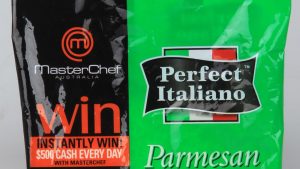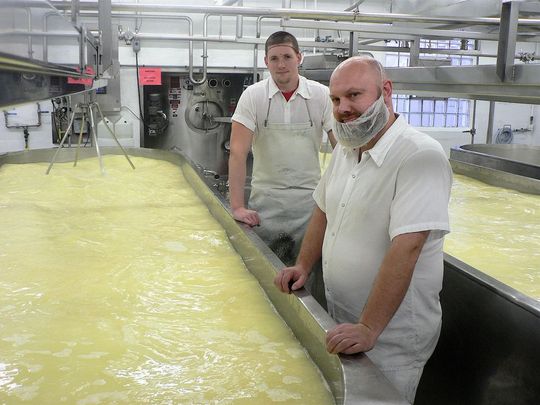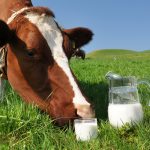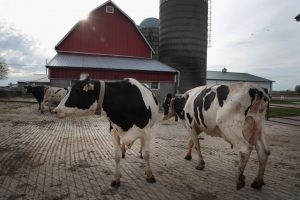
According to a study commissioned by the U.S. Dairy Export Council and the Consortium for Common Food Names, if the EU were to prevail in its quest to limit the use of a variety of common cheese names—known as geographic indications (GI)—that long ago originated in Europe, it could cost the U.S. dairy industry between $9.5 billion to $20.2 billion in revenue losses.
The study conducted by Informa Agribusiness Consulting is timely in that the EU is pushing for more restrictive language as it forges trade deals within its own borders and has secured GI status for many of its products in trade agreements with other countries.
“We see the EU’s efforts as a clear effort to restrict free trade. Here in the U.S. we have seen European groups try to take control of specific names, including parmesan, asiago, romano and gruyere,” said Patrick Geoghegan, senior vice president of Marketing and Industry Relations for Dairy Farmers of Wisconsin. “Their goal is to increase their market share by blocking U.S. competition here and abroad and force U.S. companies to use new names for cheeses that have been produced in Wisconsin for a hundred years.”
What’s in a name?
If that happens, Geoghegan predicts it will cause confusion among consumers and will result in Wisconsin companies losing customers.
“Wisconsin dairy farmers and farmers across the country have invested their hard-earned dollars in educating consumers about how to use a wide variety of cheeses made in our state for decades,” he said. “If we have to “re-brand” common cheese varieties, not only will a re-education process by immensely expensive, but we could potentially lose existing marketplace relationships and see cheese consumption decline.”
The study concurs, predicting a strong and negative consumer reaction, causing the consumption of U.S. produced cheeses to “fall off dramatically” (anywhere between 306 to 814 million pounds in the first three years). The value of that lost consumption is $3.1 billion.
“U.S. consumers, long familiar with purchasing “feta” and “parmesan” cheeses, among others, may not purchase as frequently or pay as much for, the same cheese now re-labeled as “crumbled sheep cheese” or “hard grated cheese”, the study pointed out.
Restaurants would also need to consider consumer perception impact of relabeling menu offerings vs. altering supply sources to conform with consumer expectations.
Export impact
Since its inception in 1994, the Wisconsin Specialty Cheese Institute has worked hand in hand with the state’s specialty cheese companies in helping them to identify new market opportunities, which includes international markets.
These specialty cheeses are the fastest-growing category in Wisconsin and many of those businesses depend on the export market.
“The export of Wisconsin cheese is growing rapidly,” Geoghegan pointed out. “The EU’s efforts have already hurt our business in Mexico—our top export market—where last year the previous Mexican government caved to EU demands to relinquish many food names, giving the EU a virtual monopoly on these products.”
Geoghegan estimates that 40 percent of Wisconsin cheesemakers are involved in exporting their products.
“We make 45 percent of all specialty cheese, a wide and innovative network of 125 cheese facilities produce a quarter of all U.S. cheese volume and more than 600 varieties and types of cheese,” he said. “If the EU (prevails with GI labeling restrictions), it will mean immediate damage to U.S. cheese producers of specialty cheeses, as well as dairy farmers,” he said.
Falling demand, prices
In 2017, the U.S. produced over 5.7 million metric tons of cheese. Cheeses at risk of being impacted by EU GI classification—asiago, brie/camembert, cheddar, emmental, feta, fontina, gorgonzola, gouda, grana, havarti, mozzarella, muenster, parmesan, provolone and romano—accounted for 65 percent of total U.S. cheese production.
The loss of use of those generic cheese names would result in lower demand and reduction of 14 percent for U.S. made cheeses, while U.S. imports of European-made cheeses would increase nearly 13 percent, according to the study.
“The European Union has repeatedly targeted the U.S. dairy industry by undermining our ability to freely use generic cheese names in foreign markets,” said Tom Vilsack, chairman and CEO of the U.S. Dairy Export Council.
Sharing the pain
Vilsack said the impact of GI restrictions would not be limited to the cheese industry, but also on the farm and across the U.S. economy.
The changing consumer demand for U.S. cheeses would have a profound, detrimental impact on the U.S. dairy industry. Milk consumption would fall by 1.4 to 4.6 percent in the first three years.
The declining consumption would strongly pressure farm gate milk prices, which could fall by $0.97 per cwt. to $2.14 per cwt. (between 5.4 percent to 11.9 percent).
The study predicts that dairy farm margins would be significantly below breakeven levels seven years of the ten years analyzed.
Low milk prices and poor farm margins would exacerbate the ongoing loss of U.S. dairy farms and a decrease in cow numbers. By 2025, national herd numbers would decline to around 460,000 to 740,000 head.
Through plummeting prices and shifting demand, U.S. dairy farmers would have lost a cumulative $36.5 billion to $71.8 billion in farm revenue by 2025, and the broader U.S. economy. Informa’s study notes that potential job losses ranging from 108,000 up to 223,000 across the supply chain could occur.
Confronting the EU
Geoghegan said the Consortium of Common Food Names (CCFN), a non-profit organization that includes several leading Wisconsin-based cheese companies such as Bel Gioioso, Sartori and Klondike Cheese–and others with operations here, such as Saputo, is working to retain the U.S.’ right to continue to use these common food names.
“CCFN is providing information to the Administration in hopes it can secure commitments from our trading partners that build upon the positive precedent established in the USMCA side letter with Mexico, which affirmed market access rights on a list of generic product terms,” Geoghegan said.
The group also encourages the Administration to evaluate the full range of tools at its disposal to address what has been described as the “deeply asymmetrical” nature of the U.S.-EU food trade relationship.
“The EU wants it both ways—access to the U.S., a large and lucrative market for many European food makers, even as the EU bans the import of accurately labeled common name U.S. foods into its own market,” Geoghegan said.
Vilsack says the U.S. must make it abundantly clear that attempts to restrict common names in our domestic market will be met with swift and forceful opposition.
Future growth
“Failing to confront the European Union’s aggression will have a serious impact on the United States’ ability to continue to expand exports, negating the important progress dairy has made towards securing The Next 5 percent,” Vilsack added.
The Next 5 Percent is an industry initiative to increase U.S. dairy export volume from approximately 15 percent of the U.S. milk supply to 20 percent through a coordinated effort between USDEC and dairy suppliers that builds upon existing markets and cultivates new ones.
Geoghegan says the global food business is extremely competitive and U.S. producers have faced many challenges in the past. He hopes that the latest threat will be resolved.
“Consumers love cheese and Wisconsin has a tremendous reputation for quality products,” Geoghegan said. “Through dairy farmers support of promotion and through the efforts of cheese companies alike, we have created strong demand for Wisconsin and have familiarized once-obscure cheeses like asiago and romana to millions of Americans.
“We hope that fairness prevails here because we think we can compete with cheesemakers anywhere in the world when operating on equal footing,” he added.

























